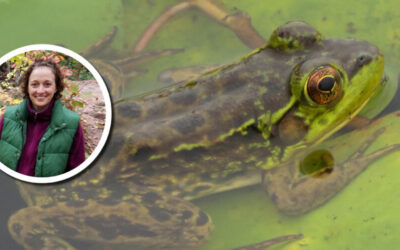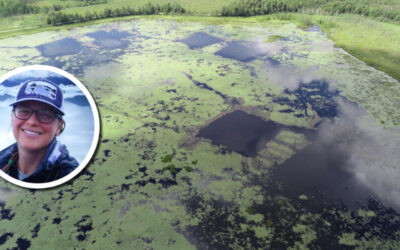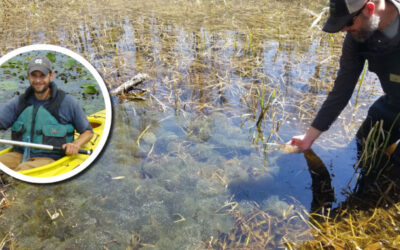Wetland Coffee Break
The Wetland Coffee Break series helps keep our community of wetland lovers connected and learning about wetlands throughout the year, from anywhere! Bring your coffee and learn about wetlands, the plants and animals that call them home, and the many natural benefits they provide to our communities. Sessions are held on Zoom and feature time for audience Q&A.
See below for a list of upcoming presentations and to register. Once you register, you’ll receive an automatic email including the URL link and password you’ll need to access the meeting. We record and post each presentation so you can watch any that you missed live. You’ll find links to these recordings below, and you can also find them on our Facebook page.
We are grateful to all of the presenters for sharing their knowledge and expertise and to everyone interested in learning more about wetlands! If you are interested in giving a Wetland Coffee Break presentation, or if you have a wetland topic you’d like to see covered, please contact Katie.Beilfuss@wisconsinwetlands.org.
We are now able to provide attendance verification to Wetland Coffee Break audience members who attend the live sessions and request this service. We created this mechanism in response to requests from members of the Wetland Coffee Break audience who would like to apply their Wetland Coffee Break learning to their continuing education or certification requirements. Learn more about how to receive attendance verification here.

Register for a Wetland Coffee Break
Wetland portrayal in modern films
Dr. Jeffrey Matthews, University of Illinois Urbana Champaign
Friday, January 17, 2025*
10:30 am CT
* the day Oscar nominations are announced!
Description
After viewing 163 films that included swamps, bogs, and other types of wetlands, we analyzed how filmmakers have used wetlands as storytelling devices, potentially shaping viewers’ perceptions. Wetlands are predominantly portrayed negatively in film, often as trials and tribulations for the protagonists. Hear from Jeff Matthews, University of Illinois, about how such portrayals could influence wetland conservation by perpetuating negative attitudes about these important ecosystems.
Jeff Matthews is an Associate Professor in the Department of Natural Resources and Environmental Sciences at the University of Illinois Urbana-Champaign. Dr. Matthews conducts field experiments and observational studies on plant communities in both natural and restored ecosystems to identify the factors driving changes in ecological communities.
Into Whooperland : A photographer’s journey with whooping cranes
Michael Forsberg, Conservation photographer and faculty, University of Nebraska-Lincoln
Friday, January 31, 2025
10:30 am CT
Description
Conservation photographer Michael Forsberg spent the last five years camera-in-hand exploring the natural history of whooping cranes across the continent, meeting people who love them, and discovering how these tall, magnificent, and rarest of cranes are navigating our 21st-century world. In this multimedia presentation, Mike will take you on a wild, wonderful, and sometimes heartbreaking journey from whooping crane wintering grounds along the Texas Gulf Coast to their remote nesting grounds in northern Canada, and on migration through the heart of the Great Plains.
Michael Forsberg was born and raised in Nebraska and has been a professional photographer for 30 years. His books, articles, and films focus on wildlife and conservation stories in the Great Plains. Mike is a Senior Fellow with the International League of Conservation Photographers, co-founder of Platte Basin Timelapse, and on faculty with IANR at the University of Nebraska–Lincoln. Mike lives in Lincoln with his wife, Patty. They have two daughters, Elsa and Emme, and a menagerie of animals.
For the love of wetlands: Exploring wetland protection and restoration potential in Wisconsin
Peter Levi, The Nature Conservancy
Friday, February 14, 2025
10:30 am CT
Description
Wetlands provide critical ecosystem services, yet human activities have greatly diminished their area across the state. The Nature Conservancy in Wisconsin has developed multiple tools to highlight high quality wetlands to prioritize protection efforts as well as impaired wetlands with high restoration potential. Peter will provide a glimpse into the publicly available tools to enable wetland enthusiasts to explore opportunities for wetland restoration in their local landscapes.
Peter Levi is a freshwater ecosystem ecologist interested in the interconnections between people and places. In his role with The Nature Conservancy (TNC), he leads the science initiatives for the state chapter with emphases in ecosystem health and climate change. Prior to joining TNC, Peter worked in higher education for 20 years, researching streams, lakes, and wetlands throughout the Midwest and abroad with a keen interest in phosphorus and nitrogen.
The fur trade and the north woods environment
Hayden L. Nelson, University of Kansas
Friday, March 14, 2025
10:30 am CT
Description
Histories of the fur trade typically focus on the economic rise and fall of the European fur market, intercultural connections forged between Indigenous people and Euro-Americans, or the wars between Native Nations due to economic participation and alliances. However, an important yet understudied aspect underlying all of those is the fur trade environment. Between 1630 and 1830, fur hunters exterminated more than 95 percent of the region’s beaver population. In this talk, Hayden Nelson will share how the historical overhunting of beavers substantially altered the forested wetlands around Lake Superior. He’ll also discuss the interconnected ways in which other animals responded to the decline of beaver.
Hayden L. Nelson is a PhD Candidate in History at the University of Kansas, where he specializes in environmental and Indigenous history in the North American West. His dissertation, “The North Woods: An Environmental History from the Pleistocene to the Pyrocene,” investigates how both human and non-human actors interacted with and transformed the transnational forested region of the western Great Lakes and Upper Mississippi watersheds from the end of the Wisconsin glaciation to the beginnings of industrial logging. His work has been supported by the American Society for Environmental History, the Newberry Library, the United States Forest Service, and more.
Watch previous presentations
Click “Older Entries” below to see more past presentations, or view our Google Sheet index of past presentations here.
Wetland Coffee Break: Mink frog calling surveys
The mink frog, a Species of Special Concern, is a special focus due to its rarity, susceptibility to climate change in Wisconsin, and unusual calling pattern.
Wetland Coffee Break: Spur Lake: A long and unfinished journey
Carly and Nathan discuss the efforts of a collaborative working group to understand why wild rice has disappeared from Spur Lake and explore options for bringing it back.
Wetland Coffee Break: Wetland conservation practices for landowners
Learn from Tally Hamilton and Gretchen Skudlarczyk—wetland experts with years of experience working with private landowners—about some of the practices and programs available to restore and enhance wetlands on private lands.
Wetland Coffee Break: Fascinating species frequenting ephemeral ponds
Learn more about the multi-year citizen science amphibian-focused research project studying ephemeral ponds in east central Wisconsin from citizen-scientist Greg Burns.
Wetland Coffee Break: Establishing a citizen science salamander and ephemeral pond monitoring program in Wisconsin
What are ephemeral ponds, and why are they important to amphibians and other critters?
Wetland Coffee Break: Bryophyte floristic quality assessments of Wisconsin peatlands
Join Keir Wefferling to learn what these non-vascular plants, like mosses, liverworts, and hornworts, can tell us about the health of Wisconsin peatlands.






